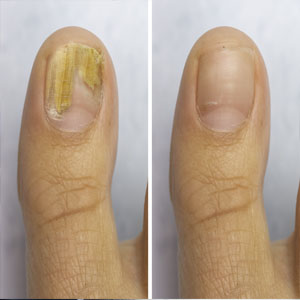
Fungal Nail Treatment
There are two main types of fungal nail infection. The first is the candida fungus, which appears as a while powder-like substance that settles anywhere on the surface of the nail and eventually penetrates down through the nail. The longer this is left on the nail without treatment, the more difficult it is to get rid of. This condition is often caused by nail varnish left on the nails for a long time.
The second is the dermatophyte Fungas which appears as a yellow/brown discolouration on the nail. The nail infection occurs when a fungus penetrates under the top of the nail making its way into the nail bed. While it lives on the nail bed it gradually travels down the nail feeding off the keretin in the nail causing the nail to discolour to a yellow/brown colour. The nail will eventually thicken and have a crumbly/brittle texture and separate from the nail bed. The cause is a combination of micro-trauma and feet which are prone to fungal skin infection, which then passes under the nail. Feet which are prone to sweating, maceration, and dampness or not dried enough after showering will be prone to fungal skin infection.

Treatment at Nenagh Footcare Clinic
Fungal nail infections are common and unless dealth with quickly, they are very difficult and take a long time to get rid of. Topical lacquers will only work if the fungal infection is at the very top of the nail. Once it penetrates further down the nail, nail lacquers will not be effective as they can no longer reach the fungus as it travels down the nail bed.
At Nenagh Footcare Clinic the Lacuna Method of fungal nail removal is offered. This is a very effective treatment for the removal of dermatophyte fungus where micro holes are drilled into the nail plate allowing a topical anti-fungal spray to be used to effectively penetrate to the nail bed and clear the infection. This treatment is repeated at 6 week intervals until the fungus has cleared from the nails.

Expert Advice
Advice offered will be specific to your fungal nail infection. All treatment options which best suit your needs will be discussed. Advice given will depend on the severity of the fungal infection and will take into consideration the wishes of the client. If your fungal nail infection is severe you may be referred to your GP for oral antifungal treatment.
